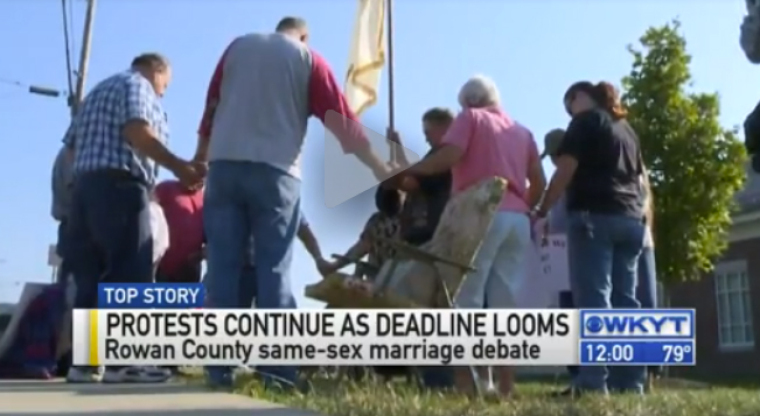Kentucky clerk appeals to U.S. Supreme Court rather than issue same-sex marriage licenses

WASHINGTON (Christian Examiner) -- Kim Davis, County Clerk for Rowan County, Kentucky, for nearly 30 years, filed an emergency injunction with the United States Supreme Court last week in an attempt to protect her right to abide by her religious convictions on the job and withhold marriage licenses from same-sex couples.
Davis belongs to the Apostolic Christian denomination and has never issued a same-sex marriage license. She stopped issuing licenses to heterosexual couples as well June 26 when the United States Supreme Court announced its Obergefell v. Hodges decision legalizing same-sex marriage in all 50 states.
The American Civil Liberties Union sued Rowan in July on behalf of one same-sex and two heterosexual couples. Two weeks ago, U.S. District Judge David Bunning ordered Davis to issue the marriage licenses but stayed his ruling until Aug. 31 pending the outcome of her appeal to the U.S. 6th Circuit Court of Appeals.
A three-judge panel from the appeals court denied Davis' appeal Aug. 26 based on what they was the likelihood of her prevailing in the court case. Davis' office continues to interpret Bunning's stay as valid until Aug. 31 meaning her stance of issuing no marriage remains unchanged.
Davis' attorney, Mat Staver, chairman of Liberty Counsel, said the Court of Appeals denial essentially means no religious accommodations will be made for individuals. He sees that as illogical since individuals perform actions on behalf of the government. "They don't lose their individual constitutional rights just because they are employed in a public office," he said.
The emergency injunction asks United States Supreme Court Justice Elena Kegan to extend Bunning's stay beyond Aug. 31 while Davis waits for her appeal to go before the full Appeals Court. Kegan supervises the 6th District.
Staver utilizes his argument about denial of religious freedom to public officials when decisions such as that of the three-judge panel are made. "[S]uch individual rights and freedoms so fundamental to liberty are neither absolutely surrendered at the entry door of public service nor waited upon taking an oath of office. To suggest otherwise creates a religious (or anti-religious) test for holding office – which the United States and Kentucky Constitutions expressly forbid," he wrote.
The document goes on to list potential consequences of lack of accommodation of religious beliefs for public officials such as pacifists being forced into combat duty, people being forced to work on their Sabbath day despite religious objections, and capital punishment opponents being forced to participate in executions despite religious objections.
"Each of these prior examples illustrate that the majority who adhere to a general law (regardless of their motivation) do not control the dictates of individual conscience," the document continues.
Kagen sided with the majority opinion in the Obergefell v. Hodges decision which ruled, in part, First Amendment protections for religious organizations and persons still apply when such persons teach principles central to their lives and faiths "and to their own deep aspirations to continue the family structure they have long revered."
While county clerks in other areas of the country have resigned rather than issue same-sex marriage licenses, Davis has no plans to resign.
At the time of Bunning's order, Roger Gannam, senior litigation counsel at Liberty Counsel, described Davis as "resolute in vindicating her rights."
RELATED ARTICLES:
Federal judge: Apostolic Christian clerk must issue same-sex marriage licenses